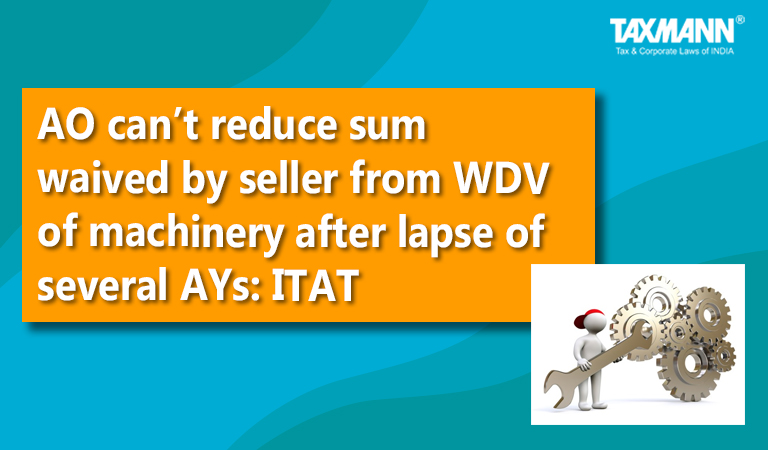AO can’t reduce sum waived by seller from WDV of machinery after lapse of several AYs: ITAT
- Blog|News|Income Tax|
- 2 Min Read
- By Taxmann
- |
- Last Updated on 28 September, 2021

Case Details: Shapers India Private Limited v. DCIT - [2021] 130 taxmann.com 409 (Pune - Trib.)
Judicial and Counsel Details
-
- R.S. Syal, Vice President and S.S. Viswanethra Ravi, Judicial Member
- Kishor Phadke for the Appellant. S.P. Walimbe for the Respondent.
Facts of the Case
The assessee was engaged in manufacturing Moulds and Plastic molded components. It had purchased certain Plant & machinery items from Sermo Sable (SS) during the previous year ending 31.03.2003. A sum of Rs. 45.18 lakhs was payable to SS, which was waived off on 31.12.2005. The assessee wrote off the amount payable to SS and created Capital Reserve in its books of account in that year for an equal amount.
While finalizing the re-assessment, the Assessing Officer (AO) questioned the assessee’s depreciation claim worth Rs. 6,54,950/- during Assessment Year 2011-12 on such amount which was transferred to Capital reserve account. The assessee submitted that write-back of the creditor was made in the AY 2006-07, and it had no relation with the year under consideration, i.e., AY 2011-12.
However, AO rejected the assessee’s contention and disallowed the depreciation claim of Rs. 6,54,950/-. The CIT(A) also upheld the order AO. Aggrieved-assessee filed the instant appeal before the Tribunal.
ITAT Held
The Pune Tribunal held that assessee spent a hypothetical figure of Rs.100 on purchasing the machinery in the year ending 31.3.2003. It was during the year ending 31.3.2006 that the assessee got the waiver, say Rs. 40. This amount qualified to reduce the `actual cost‘ of the machinery when such waiver was vested in the assessee, that was, year ending 31.3.2006.
However, the assessee didn’t reduce Rs. 40 from Rs. 100 in that year and further, AO didn’t disturb the actual cost/written down value (WDV) at gross value of Rs. 100 for that year and also granted depreciation accordingly. Once the assessment for the A.Y. 2006-07 concluded with such gross value of the asset, the stage for altering the actual cost/WDV on account of the loan, waiver got over.
The AO did not reduce the amount of waiver from the value of the block of asset for that year and allowed the gross value of the block to attain finality. This position continued as such in later years as well when the assessee kept on claiming depreciation on Rs. 40 after giving a similar Note in the Final accounts.
Thus, AO got denuded of the power to reduce depreciation after so many years in the A.Y. 2011-12. Accordingly, depreciation had to be allowed on the WDV of the block of Machinery at the gross value without reducing the waiver of loan.
Disclaimer: The content/information published on the website is only for general information of the user and shall not be construed as legal advice. While the Taxmann has exercised reasonable efforts to ensure the veracity of information/content published, Taxmann shall be under no liability in any manner whatsoever for incorrect information, if any.

Taxmann Publications has a dedicated in-house Research & Editorial Team. This team consists of a team of Chartered Accountants, Company Secretaries, and Lawyers. This team works under the guidance and supervision of editor-in-chief Mr Rakesh Bhargava.
The Research and Editorial Team is responsible for developing reliable and accurate content for the readers. The team follows the six-sigma approach to achieve the benchmark of zero error in its publications and research platforms. The team ensures that the following publication guidelines are thoroughly followed while developing the content:
- The statutory material is obtained only from the authorized and reliable sources
- All the latest developments in the judicial and legislative fields are covered
- Prepare the analytical write-ups on current, controversial, and important issues to help the readers to understand the concept and its implications
- Every content published by Taxmann is complete, accurate and lucid
- All evidence-based statements are supported with proper reference to Section, Circular No., Notification No. or citations
- The golden rules of grammar, style and consistency are thoroughly followed
- Font and size that’s easy to read and remain consistent across all imprint and digital publications are applied



 CA | CS | CMA
CA | CS | CMA
